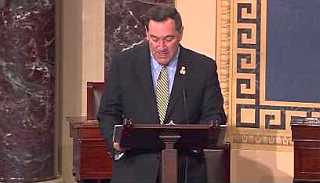 Washington, D.C.—Thursday, U.S. Senator Joe Donnelly, who serves on the Senate Armed Services Committee, delivered a speech on the Senate floor outlining his support for the proposed nuclear agreement with Iran. Donnelly emphasized the importance of preventing Iran from obtaining a nuclear weapon and America’s obligation to exhaust every other option before considering putting servicemembers in harm’s way.
Washington, D.C.—Thursday, U.S. Senator Joe Donnelly, who serves on the Senate Armed Services Committee, delivered a speech on the Senate floor outlining his support for the proposed nuclear agreement with Iran. Donnelly emphasized the importance of preventing Iran from obtaining a nuclear weapon and America’s obligation to exhaust every other option before considering putting servicemembers in harm’s way.
Donnelly said, in part, “With or without this deal, the day may come, when we are left with no alternative but to take military action to prevent Iran from crossing the nuclear threshold. The burden and danger would, as always, be on the shoulders of our servicemembers, who put their lives on the line for our country. Indiana is home to the nation’s 4th largest National Guard contingent, with more than 14,000 Hoosiers standing ready to serve their communities and our country… If the day does come that I am faced with a vote on whether to authorize military action against Iran, I owe it to our Armed Forces and to the people of Indiana to have tried all other options to stop Iran before we consider putting our servicemembers into harm’s way.”
“I believe this agreement is, as my predecessor and friend former U.S. Senator Richard Lugar recently said, ‘…our best chance to stop an Iranian bomb without another war in the Middle East.’
Watch the full speech as delivered here.
Background:
Donnelly has long-supported diplomatic efforts, including both tough sanctions and the P5+1 negotiations, to address the threat posed by Iran’s nuclear program. He has cosponsored bipartisan legislation imposing sanctions on Iran in Congress, including the Nuclear Weapon Free Iran Act of 2015. In February, Donnelly joined a bipartisan coalition, including six Democratic and six Republican senators, to introduce the Iran Nuclear Agreement Review Act, which passed both chambers of Congress and was signed into law, requiring that Congress review the Iran deal prior to its implementation.
As Ranking Member of the Strategic Forces Subcommittee on the Senate Armed Services Committee, with oversight of U.S. nuclear weapons programs and global non-proliferation efforts, Donnelly has participated in dozens of classified and open hearings, meetings, and conversations about Iran’s nuclear program and the proposed agreement in Washington, in Indiana, and during recent trips to the Middle East. He has discussed the topic with the Obama Administration, U.S. allies in the Middle East, members of the P5+1, nuclear scientists, intelligence analysts, military leaders, and national security and foreign policy experts.
Donnelly has listened to the views of Hoosiers across Indiana, both supportive and critical, including Lugar and former Congressman Lee Hamilton. While serving in the Senate, Lugar and Senator Sam Nunn forged a bipartisan partnership to author landmark legislation to dismantle and destroy weapons of mass destruction in the former Soviet Union. Lugar and Nunn recently wrote an op-ed, published in Politico, that said, “Although there are no absolute guarantees, nor can there be in diplomatic accords, our bottom line is that the agreement makes it far less likely that the Iranians will acquire a nuclear weapon over the next 15 years…Our own conviction is that this agreement represents our best chance to stop an Iranian bomb without another war in the Middle East.” To read the full op-ed, click here.
Since 2006, the United States, along with the four other permanent members of the UN Security Council (Great Britain, France, Russia and China, or the P5) and Germany (+1) have been engaged in talks with Iran to address concerns about Iran’s nuclear activities.
Prior to the interim agreement established in November 2013, even in the face of international sanctions, Iran was rapidly expanding its nuclear program with more than 19,000 centrifuges; a stockpile of more than 11,000 kilograms of enriched uranium, including highly enriched uranium at the 20% level; and a heavy water reactor capable of producing weapons grade plutonium.
In November 2013, the P5+1 announced an interim deal to freeze Iran’s nuclear program while negotiations continued, and in July 2015, the group announced a proposed final agreement, known as the Joint Comprehensive Plan of Action (JCPOA), more commonly referred to as the Iran deal.
Under the final agreement, Iran must get rid of 98% of its stockpile of enriched uranium, two-thirds of its centrifuges and the existing core of its heavy water plutonium reactor. It will be barred from producing or acquiring highly enriched uranium or weapons-grade plutonium for 15 years, permanently barred from obtaining a nuclear weapon, and subject to the most comprehensive and intrusive inspections regime in history.














